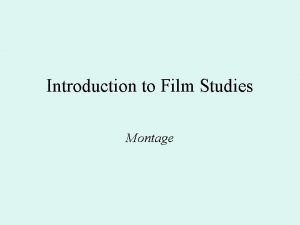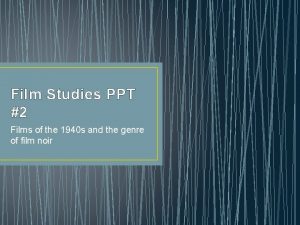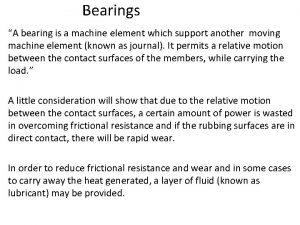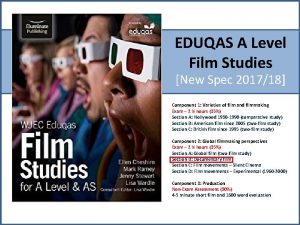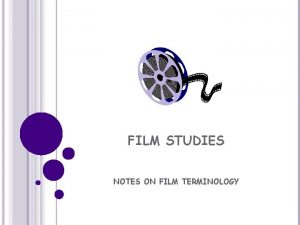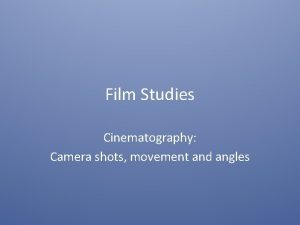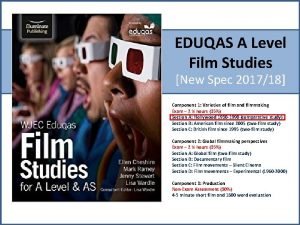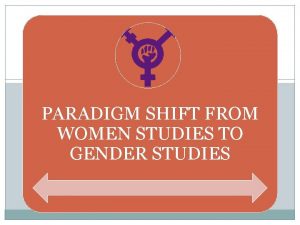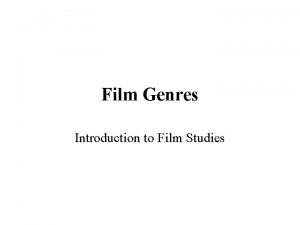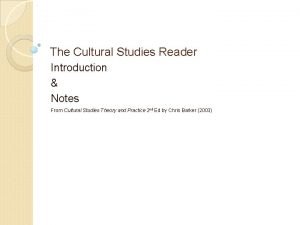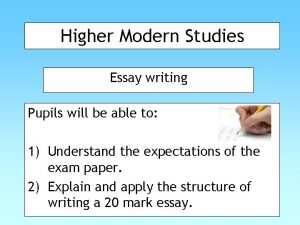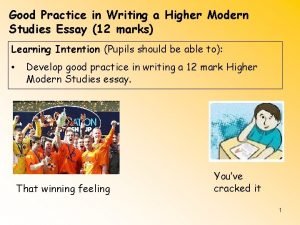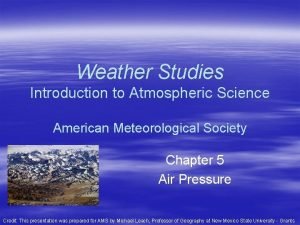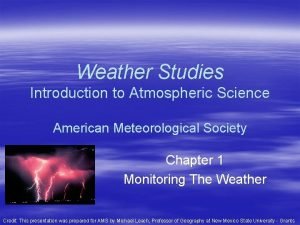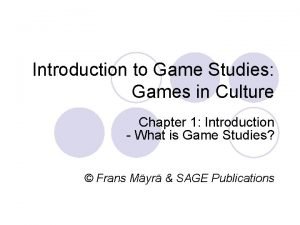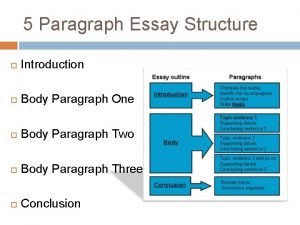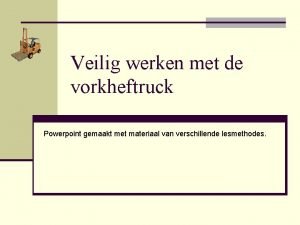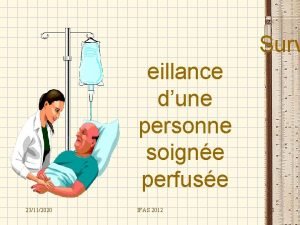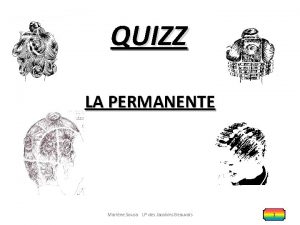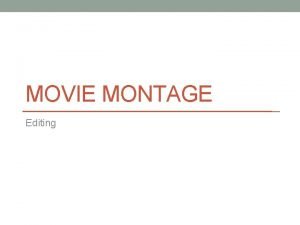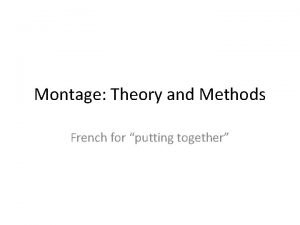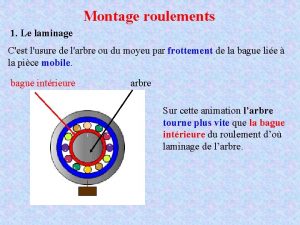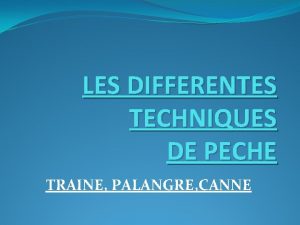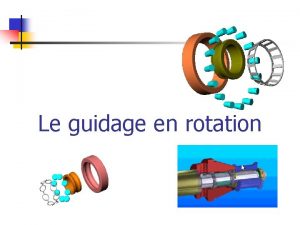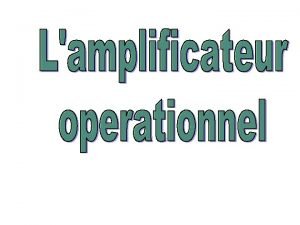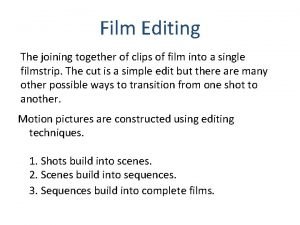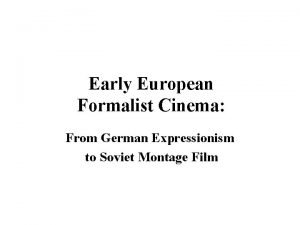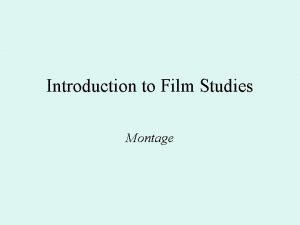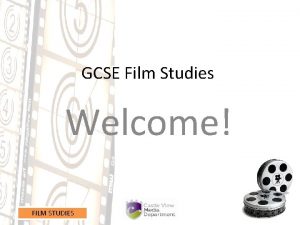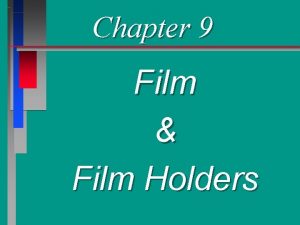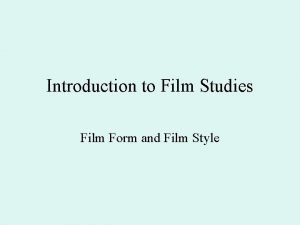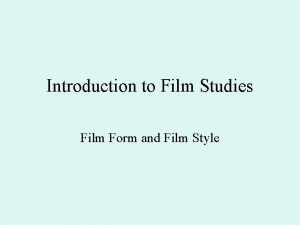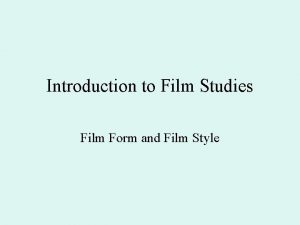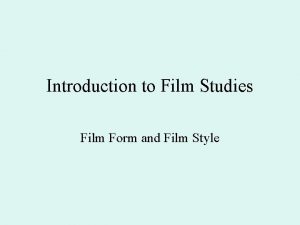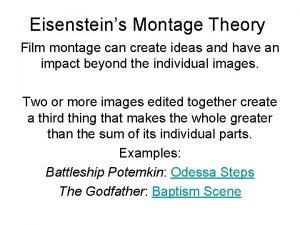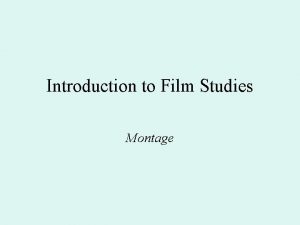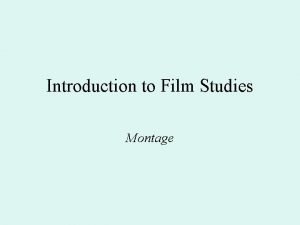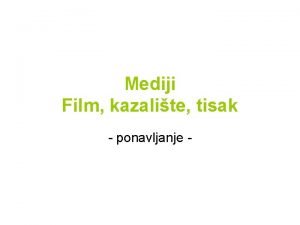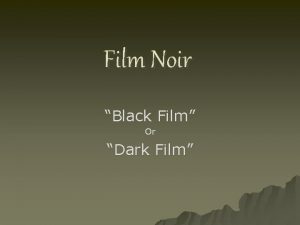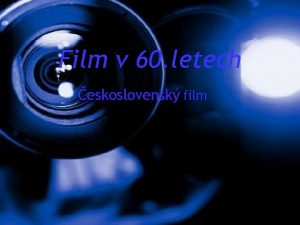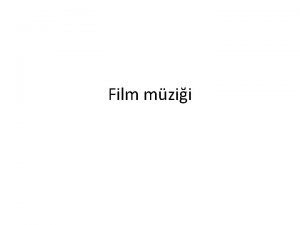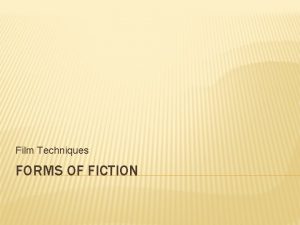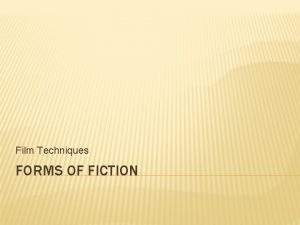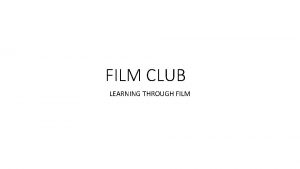Introduction to Film Studies Montage Montage Montage a






























- Slides: 30

Introduction to Film Studies Montage

Montage • Montage – a French term for ‘editing’, ‘putting together’ or ‘assembling’ shots • Editing (English word) – to put together and coordinate shots • Frame = a single (still) image, the smallest component of a motion picture • fps = a camera lets films run through it at a rate of 24 frames per second and projector lets exposed positive films at the same rate • Shot = made of a series of frames and it is continuous (without a cut)

Montage • Film stock – frame – continuous run of frames – a shot

Montage • The editor discards unwanted footage e. g. The editor of The Net (1995) dealt with 300 reels (3, 000 minutes or 50 hours) and culled them to 12 reels (120 minutes or 2 hours) • The editor also cuts superfluous frames such as those showing the clapboard from the beginnings and endings of shots. • Then the editor joins the desired shots, the end of the one to the beginning of another. • David Lean

Montage • A shot is joined to another in various ways • A Fade-out gradually darkens the end of a shot to black • A Fade-in gradually lighten a shot from black • A dissolve briefly superimposes the end of shot A and the beginning of shot B, while shot A gradually gives away to shot B • Citizen Kane • In a wipe shot B replaces shot A by means of shot B moving across the screen • Seven Samurai

Montage • The cut is the most common way of joining two shots by means of splicing together them by cement or tape • Early moviola (editing machine) now obsolete and replaced by video transfer on a tape or disc • Editing 6. 20 • Instantaneous change from a shot to another without interruption (c. f. other editing techniques)

Dimensions of Film Editing • The film editor consider four aspects of editing 1. Graphic relations between shots 2. Rhythmical relations between shots 3. Spatial relations between shots 4. Temporal relations between shots Graphic Relations • Editing permits the interaction, through similarity and difference, of the pictorial qualities of shots (lighting, setting, costume, behaviour, framing, photography, and camera movement)

Graphic Relations in Editing • Graphic match – shots are edited together through graphic similarities • Michael Moore’s Roger and Me (The same location, similar derelict houses, the same light of the day, shot in the same camera movement)

Graphic Relations in Editing • Cutting on action or matching on action – the editor cuts from one shot to another in the way that the action in the second shot matches the one in the first. • A variation of the graphic match editing technique • G. W. Griffith’s Orphans of the Storm , 2. 50

Graphic Relations in Editing • More dynamic graphic matches • In Kurosawa Akira’s Seven Samurai, when an alarm sounds, samurais running to take their position edited in match on action

Graphic Relations in Editing • In a transitional scene of Aliens, a dissolve creates a graphic match between Ripley’s sleeping face and the curve of the Earth.

Graphic Relations in Editing • The graphic match in Aliens may have been inspired by a bold editing in 2001: A Space Odyssey, in which the shaped the ‘star child’ embryo is juxtaposed the shape of the Earth.

Graphic Relations in Editing • Adjacent shots do not have to be continuous graphically • Mild discontinuity may appear in widescreen composition in shot-reverse-shot (shots showing characters facing each other) • Wim Wender’s Paris, Texas

Graphic Relations in Editing • Over the shoulder, shot and reverse shot in Woody Allen’s Manhattan

Graphic Relations in Editing • More noticeable discontinuity • The shot of Menzies looking out of a window on frame left is dissolved to that of Susan Vargas looking at another window towards right • Orson Welles, A Touch of Evil

• Graphic conflicts between colour qualities • In Wim Wender’s Paris, Texas, the hero finds his estranged wife working in a peepshow. Wender shows the conversation by cutting from the customer’s side to the performer’s side and back to the customer’s and so forth. Their separation emphasized by harsh colour contrasts.

Birds Each shot centre’s on the action (the flaming trail and Melanie’s face), but movements thrust in different directions. Contrasts between stillness and movement

Rhythmic Relations in Editing Acceleration • A group of people talking: 1, 000 frames, 41 seconds • Melanie looking out the window 309 fr. 13 sec. • Exterior shot of a gas station: 55 fr. 2 1/3 sec • Melanie joined by Mitch and the Captain: 35 fr. 1 ½ sec. • The shot length subordinated to the internal rhythm of the dialogue and the movement in the images.

Rhythmic Relations in Editing • Melanie’s horrified reaction to the racing flames • 70 frames (Flaming car) – 20 frames – 18 frames – 16 frames – 14 frames – 12 frames – 10 frames – 8 frames – punctuate the scene by the two shots with the identical length - 34 frames (Cars at station explode) - 33 frames (Melanie covers her face) – a long shot of the city over 600 frames (pause or reverberation)

Rhythmic Relations in Editing Goodfellas • Rhythmic factors include beat, accent and tempo and rhythms in editing are supported by mise-enscène and sound. • The tempo of cutting is getting quicker and quicker as the day is getting more hectic in the helicopter sequence of Goodfellas. • Jump cuts, rock music with strong beats, clock

Rhythmic Relations in Editing • Colour footage of present-day Auschwitz in long take accompanied by languid lyrical melody on string and black-and-white historical newsreel footage is in relatively short take accompanied by string pizzicato or ironically comic tune. • Alain Resnais’s Night and Fog 2 and 25

Continuity Editing • Graphic qualities must be kept continuous from shot to shot – once composition is fixed, it must be maintained; the overall lighting tonality remain constant • The rhythm of editing has its own rules: long shots are left on the screen longer than medium shots, and medium shots are left on longer than close-ups • The aim of continuity editing is to create a smooth flow from shot to shot

• The 180° system or rule • “Axis of action’, the ‘centre line’ or the 180° line • Only the shots taken from the camera placed in the 180° area on either side of the axis of action (the white area) must be edited together.

Continuity Editing • Once the axis of action is established, the camera stays on the same side. Annie Hall

• The ensure some common space from shot to shot. • The 180° system ensures constant screen direction. • Once upon a Time in the West

Continuity Editing • Eye-line Match - in one shot a person is shown seeing off screen in one direction and in the next what he/she is seeing is shown • In Roman Polanski’s The Pianist Szpillman moves in a new hideout. He looks off screen right at the window and in the next shot the street below is shown. He hears the jangle of keys and next his benefactor is standing with the keys.

Continuity Editing • At the end of Sergio Leone’s Once upon a Time in America, David (Robert De Niro) visits a graveyard where his best friends from his childhood are buried. • POV (point-of-view) shots of David shows all the names of the dead. Once upon a Time in America

Continuity Editing • Match on action or cutting on action – the first shot is cut to another shot in the way the action started in the former continues in the latter and matches the action in the latter. • In Stephen Soderbergh’s Traffic, a man jumps in shot A and lands on the ground in shot B.

Continuity Editing • In Bringing up Baby, the shot in which Katherine Hepburn strikes a match is cut to the shot in which she is lighting a cigarette. • The action is continuous and matching.

Continuity Editing • The 180° rule and the eye-line match are carefully observed and give the viewer consistent sense of direction in Alfred Hitchcock’s Rear Window. Jeffrey is a photographer on wheelchair and kills his time by looking into the apartments across from his.
 Montage in film studies
Montage in film studies Film genres ppt
Film genres ppt Wedge film journal bearing
Wedge film journal bearing Eduqas a level film
Eduqas a level film Film studies terminology
Film studies terminology Cinematography angles
Cinematography angles A level film studies past papers
A level film studies past papers Paradigm shift from women studies to gender studies
Paradigm shift from women studies to gender studies Film genre meaning
Film genre meaning Introduction to cultural studies summary
Introduction to cultural studies summary How to write a higher modern studies essay
How to write a higher modern studies essay Advanced higher modern studies essay examples
Advanced higher modern studies essay examples Weather studies introduction to atmospheric science
Weather studies introduction to atmospheric science American meteorological society
American meteorological society An introduction to game studies
An introduction to game studies Intro paragraph outline
Intro paragraph outline Gevarendiamant
Gevarendiamant Dialaflow c'est quoi
Dialaflow c'est quoi Permanente quinconce
Permanente quinconce Thematic montage
Thematic montage Methods of montage
Methods of montage Soviet montage
Soviet montage Laminage roulement
Laminage roulement Peche a la traine montage
Peche a la traine montage Guidage en rotation exemple
Guidage en rotation exemple Montage sommateur inverseur
Montage sommateur inverseur Parallel editing in film
Parallel editing in film Hydrodistillation montage
Hydrodistillation montage Montage editing definition
Montage editing definition Non diegetic sound
Non diegetic sound Montage college essay
Montage college essay
